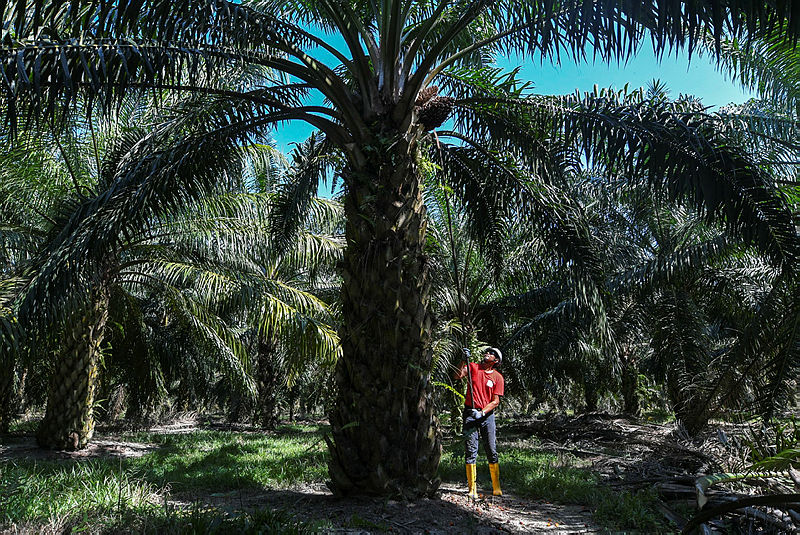KUALA LUMPUR: Oil palm and rubber were the two main crops cultivated in 317 land schemes under the Federal Land Development Authority (Felda) since its establishment 61 years ago.
However, the fluctuating prices of these agricultural commodities, planted over a total of 490,000 hectares nationwide, have left the government, Felda and settlers grappling with challenges.
Apart from the current low market prices, the anti-oil palm lobby mounted by western nations has also had repercussions on the product’s marketability.
Some 112,635 settlers and their families are hard-pressed to earn a decent living although each settler receives a cost of living loan and yield advance of RM1,500 a month from Felda.
On April 10, Economic Affairs Minister Datuk Seri Mohamed Azmin Ali tabled a White Paper in Parliament titled “Towards Felda’s Sustainability”, outlining the issues faced by the authority and the steps to be taken to ensure the future well-being of the settlers.
To prove its commitment to rehabilitating Felda, the Pakatan Harapan government is set to inject funds totalling RM6.23 billion, to be channelled to the authority in stages in the form of grants, loans and government guarantees to support the initiatives to be undertaken by Felda to restructure and strengthen its operations.
The government has also agreed to abolish interest rates on the cost of living loan and yield advances taken by the settlers through an injection of funds totalling RM2 billion.
Alternative sources of income
Kami Anak Felda (KAF) Agricultural and Agro-based Bureau chairman Datuk Muhamad Asri Haris said the incomes of settlers were badly hit during the replanting process.
(KAF is a non-governmental organisation established in March 2016 to engage and empower Felda’s second and third generations of settlers.)
That is when all the old and unproductive trees are felled to pave the way for replanting. The entire process takes about four years before the settlers can start harvesting again.
“Those who have no alternative sources of income have to depend on the cost of living and yield advance payments that Felda gives them in the form of loans.
“This is why settlers are encouraged to get involved in other agricultural and livestock farming activities so that they don’t have to take these loans (from Felda),“ he said.
According to Muhamad Asri, several land schemes have, under the auspices of KAF, embarked on the cultivation of MD2 pineapple and fig and rearing cattle and rabbits for meat.
At Felda Lenga near Muar, Johor, a total of 120 settlers are jointly cultivating pineapple on a 162ha plot for the domestic market and for export to the Middle East. Each acre is planted with about 14,500 pineapple plants.
Fifty settlers based at Felda Behrang, Felda Soeharto, Felda Sungai Tengi and Felda Laka Selatan in Perak and Felda Aping Barat in Johor are currently operating rabbit farms.
Another 10 settlers at Felda Semencu (Johor), Felda Lok Heng (Johor), Felda Chemomoi (Pahang) and Felda Ciku 1 (Kelantan) operate their own cattle farms. Together, they have about 300 head of cattle with their farms totalling 158 ha.
Muhamad Asri also welcomed measures outlined in the Felda White Paper to generate new sources of income through diversification, as well as identify alternative agricultural activities that allow harvesting to be carried out within short periods.
“These are feasible... these measures must be taken in order to benefit the settlers who should not just rely on Felda for its source of revenue,“ he said.
Cash crops, livestock farming
Dean of Universiti Putra Malaysia’s Faculty of Agriculture Professor Dr Abdul Shukor Juraimi said Felda’s land schemes brim with potential for agricultural development.
He said the settlers could take up alternative agricultural or farming activities that were suited to the location and age of their land schemes.
“Schemes that are more than five years old are suitable for cattle and goat farming because by then the oil palm trees have grown big and their fronds provide shade,“ he said, adding that the settlers can easily market their produce, especially during Aidliladha.
As for newly-replanted schemes, Abdul Shukor recommends the cultivation of watermelon, banana and papaya.
“The alternative crops can be divided into two categories, the first being normal crops and the second, high-value crops like vanilla, MD2 pineapple and rockmelon,“ he explained.
Felda’s roles
Abdul Shukor also said that the two important roles of Felda should be devising land use strategies for settlers for agricultural and livestock farming purposes and helping them to market their products.
Besides oil palm and rubber, Felda should also consider cultivating other main crops on its land schemes, he said, adding that coconut was a good choice provided it is planted in suitable areas.
The academic also offered the expertise of UPM experts and researchers who, he said, could provide their advisory services to Felda in relation to land use diversification.
Agriculture and Agro-based Industry Minister Datuk Salahuddin Ayub recently announced that it would undertake a RM1 billion cash crop project in collaboration with the Economic Affairs Ministry to help resolve Felda’s financial woes within five years.
His ministry will use the expertise of the Malaysian Agricultural Research and Development Institute and Federal Agricultural Marketing Authority to make the cash crop project a success. — Bernama















